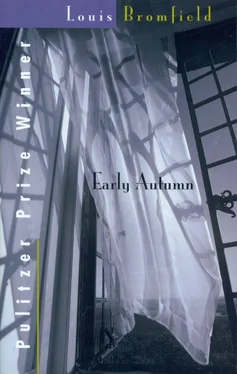Knowing these things, she had come to treat him always as a child, humoring and wheedling him until in the end she achieved what she desired, painlessly and surely. She treated him thus in the matter of refurnishing the house. Knowing that he was absorbed in finishing the final chapters of “The Pentland Family and the Massachusetts Bay Colony,” she suggested that he move his table into the distant “writing room” where he would be less disturbed by family activities; and Anson, believing that at last his wife was impressed by the importance and dignity of his work, considered the suggestion an excellent one. He even smiled and thanked her.
Then, after having consulted old John Pentland and finding that he approved the plan, she began bit by bit to insinuate the furniture of Horace Pentland into the house. Sabine came daily to watch the progress of the change, to comment and admire and suggest changes. They found an odd excitement in the emergence of one beautiful object after another from its chrysalis of emballage; out of old rags and shavings there appeared the most exquisite of tables and cabinets, bits of chinoiserie, old books and engravings. One by one the ugly desk used by Mr. Lowell, the monstrous lamp presented by Mr. Longfellow, the anemic water-colors of Miss Maria Pentland … all the furnishings of the museum were moved into the vast old attic; until at length a new drawing room emerged, resplendent and beautiful, civilized and warm and even a little exotic, dressed in all the treasures which Horace Pentland had spent his life in gathering with passionate care. Quietly and almost without its being noticed, the family skeleton took possession of the house, transforming its whole character.
The change produced in Aunt Cassie a variety of confused and conflicting emotions. It seemed sacrilege to her that the worn, familiar, homely souvenirs of her father’s “dear friends” should be relegated into the background, especially by the hand of Horace Pentland; yet it was impossible for her to overlook the actual value of the collection. She saw the objects less as things of rare beauty than in terms of dollars and cents. And, as she had said, “Pentland things ought to find a place in a Pentland house.” She suspected Sabine of Machiavellian tactics and could not make up her mind whether Sabine and Horace Pentland had not triumphed in the end over herself and “dear Mr. Lowell” and “good, kind Mr. Longfellow.”
Anson, strangely enough, liked the change, with reservations. For a long time he had been conscious of the fact that the drawing room and much of the rest of the house seemed shabby and worn, and so, unworthy of such dignity as attached to the Pentland name.
He stood in the doorway of the drawing room, surveying the transformation, and remarked, “The effect seems good … a little flamboyant, perhaps, and undignified for such a house, but on the whole … good … quite good. I myself rather prefer the plain early American furniture …”
To which Sabine replied abruptly, “But it makes hard sitting.”
Until now there had never been any music at Pentlands, for music was regarded in the family as something you listened to in concert halls, dressed in your best clothes. Aunt Cassie, with Miss Peavey, had gone regularly for years each Friday afternoon, to sit hatless with a scarf over her head in Symphony Hall listening to “dear Colonel Higginson’s orchestra” (which had fallen off so sadly since his death), but she had never learned to distinguish one melody from another. … Music at Pentlands had always been a cultural duty, an exercise something akin to attending church. It made no more impression on Aunt Cassie than those occasional trips to Europe when, taking her own world with her, she stayed always at hotels where she would encounter friends from Boston and never be subjected to the strain of barbaric, unsympathetic faces and conversations.
And now, quite suddenly, music at Pentlands became something alive and colorful and human. The tinny old square piano disappeared and in its place there was a great new one bought by Olivia out of her own money. In the evenings the house echoed to the sound of Chopin and Brahms, Beethoven and Bach, and even such barbaric newcomers as Stravinsky and Ravel. Old Mrs. Soames came, when she was well enough, to sit in the most comfortable of the Regency chairs with old John Pentland at her side, listening while the shadow of youth returned to her half-blind old eyes. The sound of Jean’s music penetrated sometimes as far as the room of the mad old woman in the north wing and into the writing room, where it disturbed Anson working on “The Pentland Family and the Massachusetts Bay Colony.”
And then one night, O’Hara came in after dinner, dressed in clothes cut rather too obviously along radically fashionable lines. It was the first time he had ever set foot on Pentland soil.
4
There were times now when Aunt Cassie told herself that Olivia’s strange moods had vanished at last, leaving in their place the old docile, pleasant Olivia who had always had a way of smoothing out the troubles at Pentlands. The sudden perilous calm no longer settled over their conversations; Aunt Cassie was no longer fearful of “speaking her mind, frankly, for the good of all of them.” Olivia listened to her quietly, and it is true that she was happier in one sense because life at Pentlands seemed to be working itself out; but inwardly, she went her own silent way, grieving in solitude because she dared not add the burden of her grief to that of old John Pentland. Even Sabine, more subtle in such things than Aunt Cassie, came to feel herself quietly shut out from Olivia’s confidence.
Sybil, slipping from childhood into womanhood, no longer depended upon her; she even grew withdrawn and secret about Jean, putting her mother off with empty phrases where once she had confided everything. Behind the pleasant, quiet exterior, it seemed to Olivia at times that she had never been so completely, so superbly, alone. She began to see that at Pentlands life came to arrange itself into a series of cubicles, each occupied by a soul shut in from all the others. And she came, for the first time in her life, to spend much time thinking of herself.
With the beginning of autumn she would be forty years old … on the verge of middle age, a woman perhaps with a married daughter. Perhaps at forty-two she would be a grandmother (it seemed likely with such a pair as Sybil and young de Cyon) … a grandmother at forty-two with her hair still thick and black, her eyes bright, her face unwrinkled … a woman who at forty-two might pass for a woman ten years younger. A grandmother was a grandmother, no matter how youthful she appeared. As a grandmother she could not afford to make herself ridiculous.
She could perhaps persuade Sybil to wait a year or two and so put off the evil day, yet such an idea was even more abhorrent to her. The very panic which sometimes seized her at the thought of turning slowly into an old woman lay also at the root of her refusal to delay Sybil’s marriage. What was happening to Sybil had never happened to herself and never could happen now; she was too old, too hard, even too cynical. When one was young like Jean and Sybil, one had an endless store of faith and hope. There was still a glow over all life, and one ought to begin that way. Those first years—no matter what came afterward—would be the most precious in all their existence; and looking about her, she thought, “There are so few who ever have that chance, so few who can build upon a foundation so solid.”
Sometimes there returned to her a sudden twinge of the ancient, shameful jealousy which she had felt for Sybil’s youth that suffocating night on the terrace overlooking the sea. (In an odd way, all the summer unfolding itself slowly seemed to have grown out of that night.)
Читать дальше












